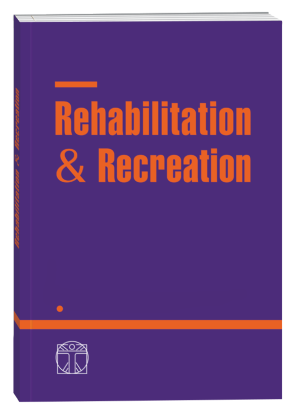FORMATION OF SOCIAL-PERCEPTIVE COMPONENT SKILLS OF CROSS-CULTURAL COMMUNICATION IN PHYSICAL CULTURE AND SPORTS
DOI:
https://doi.org/10.32782/2522-1795.2024.18.3.25Keywords:
cross-cultural communication, cross-cultural communication skills, socio-perceptive component of cross-cultural communication skills, organizational and pedagogical conditionsAbstract
The purpose of the research is to determine and develop organizational and pedagogical conditions, the implementation of which during the professional training of specialists in physical culture and sports will ensure the formation of the socio-perceptive component of cross-cultural communication skills in them. Material. As organizational and pedagogical conditions, the implementation of which, in our opinion, will ensure the formation of the socio-perceptive component of cross-cultural communication skills, were determined: 1) provision of the cross-cultural component of professional training of specialists in physical culture and sports; 2) implementation of quasi-professional cross-cultural activities of specialists in physical culture and sports by methods of innovative pedagogical technologies; 3) introduction of foreign language training based on the principles of content and language integrated learning. An experimental study was conducted to test the hypothesis that the formation of the socio-perceptive component of cross-cultural communication skills in specialists in physical culture and sports will be effective if certain organizational and pedagogical conditions are implemented. Experimental activities took place during 2020–2024 on the basis of the Zaporizhia National University. Students of the specialty 017 “Physical education and sports”, of the “Sports” educational program of the year of admission in 2020, participated in the experiment, divided into experimental (35 people) and control (36 people) groups. The results of the conducted experiment demonstrated positive dynamics regarding the level of formation of the socio-perceptive component of cross-cultural communication skills in specialists in physical culture and sports according to four measurement methods (diagnostics of communicative tolerance by V. Boyka, the scale for assessing cross-cultural receptivity (the author’s adaptation of the scale of intercultural sensitivity by G. Chen and W. Starosta), diagnosis of the level of empathic abilities by V. Boyko, diagnosis of the level of reflexivity by A. Karpov). The coefficient of formation of the socio-perceptive component of cross-cultural communication skills of the students of the experimental group thanks to the implementation of the defined organizational and pedagogical conditions increased by 0.18 (from 0.39 to 0.57), whereas in the control group it changed only by 0.02 (from 0.40 to 0.42). The statistical significance of the obtained results was proven using the Wilcoxon rank test (p<0.000, which is much smaller than the critical indicator p≤0.05). Conclusions. So, the experimental research confirmed that the implementation of the set of developed organizational and pedagogical conditions statistically reliably leads to an increase in the level of formation of the socio-perceptive component of cross-cultural communication skills.
References
Василишина Н.М. Теоретичні і методичні засади кроскультурної освіти майбутніх магістрів сфери туризму України та Туреччини в умовах євроінтеграційних процесів : дис. … доктора пед. наук : 13.00.04. Національний авіаційний університет. Київ, 2021. 655 с.
Ерін Меєр. Культурна карта. Бар’єри міжкультурного спілкування в бізнесі / пер. з англ. О. Дубчак. Київ : Наш Формат, 2020. 224 с.
Козак А.В. Формування готовності майбутніх фахівців у сфері міжнародних відносин до міжкультурної комунікації : автореф. дис. … канд. пед. наук : 13.00.04. Черкаський національний університет імені Богдана Хмельницького. Черкаси, 2012. 20 с.
Кудлай І.В., Мікуліна Т.В. Міжкультурна комунікація крізь призму спортивних практик. Україна у сучасному міжнародному просторі : матеріали міжнародної науково-практичної конференції, 13–14 червня 2022 р. Одеса. Київ : Каравела, 2022. С. 60–63. URL: (дата звернення: 05.08.2024).
Петренко Т. Сучасні техніки кроскультурної комунікації в освітньому процесі. Інноваційна педагогіка. Випуск 55. Том 3. 2023. С. 109–112. DOI: 10.32782/2663-6085/2023/55.3.22.
Сідоров В.І. Система кроскультурної підготовки майбутніх фахівців галузі туризму : автореф. дис. … доктора пед. наук : 13.00.04. Хмельницький національний університет. Хмельницький, 2019. 43 с.
Скрипнікова В. Розвиток міжкультурної компетентності у психолого-педагогічній теорії і практиці (зарубіжний досвід). Військова освіта. 2020. № 2 (42). С. 282–292. DOI: 10.33099/2617-1783/2020-2/282-292.
Токарєва А.В. Формування міжкультурної компетентності у майбутніх менеджерів зовнішньоекономічної діяльності засобами інтерактивних технологій : автореф. дис. … канд. пед. наук : 13.00.04. Університет імені Альфреда Нобеля. Дніпро, 2013. 23 с.
Цимбалюк І.О., Павліха Н.В., Цимбалюк С.М. Сталий розвиток спортивно-оздоровчої сфери регіону заради миру та безпеки. Луцьк : Вежа-Друк, 2022. 254 с.
Чиркова, Ю., Бортнікова, М. Кроскультурна бізнес-взаємодія суб’єктів зовнішньоекономічної діяльності: труднощі реалізації та оптимальні шляхи їх подолання. Економіка. Фінанси. Право. 2022. № 11/2. С. 13–18.
Chen G.M., Starosta W.J. The development and validation of the intercultural sensitivity scale. Human Communication. 2000. Vol. 3. P. 1–15. URL: https://digitalcommons.uri.edu/cgi/viewcontent.cgi?article=1035&context=com_facpubs (дата звернення: 10.06.2024).
Hiray A., Rajhans K. Cross-cultural communication barriers to managing workforce diversity in multicultural organisations. International Journal of Management Development. 2022. No. 2(2), Р. 81. DOI: 10.1504/ijmd.2022.10047312.
Downloads
Published
How to Cite
Issue
Section
License
Copyright (c) 2024 В. В. Горлач

This work is licensed under a Creative Commons Attribution-NonCommercial-NoDerivatives 4.0 International License.












